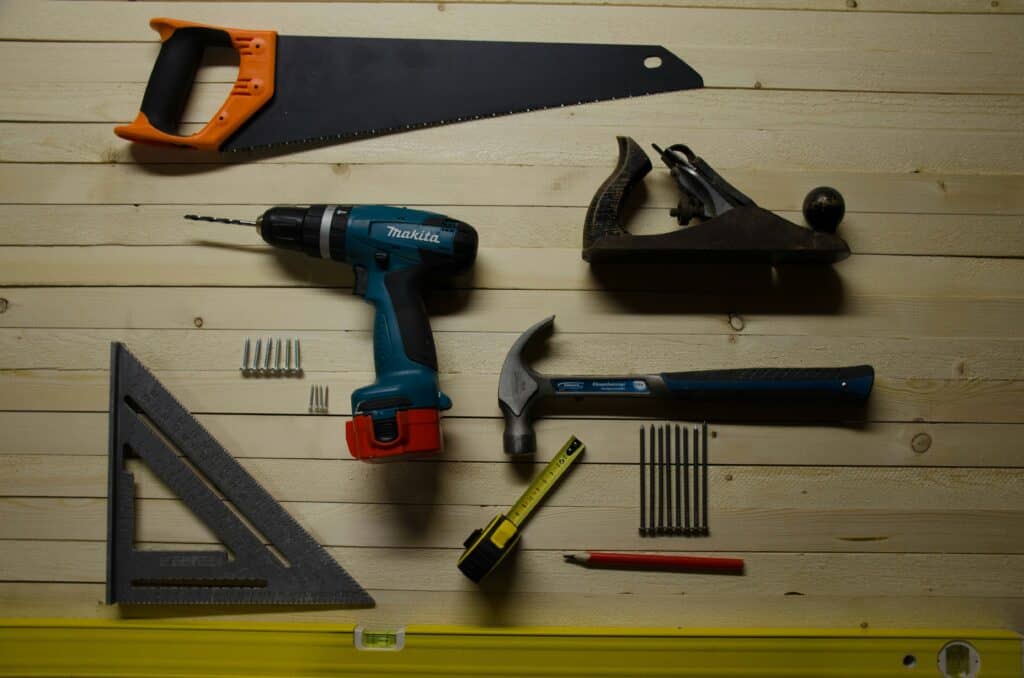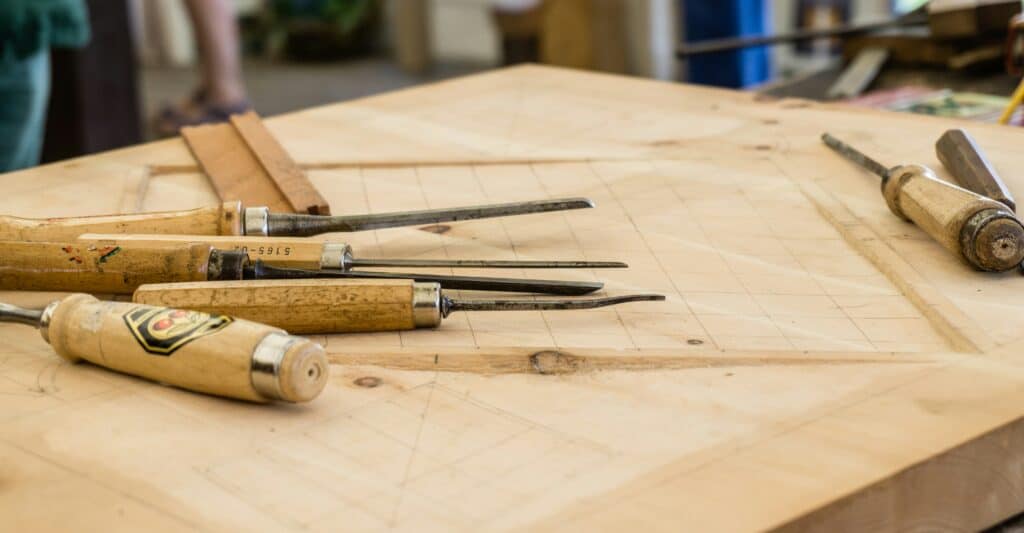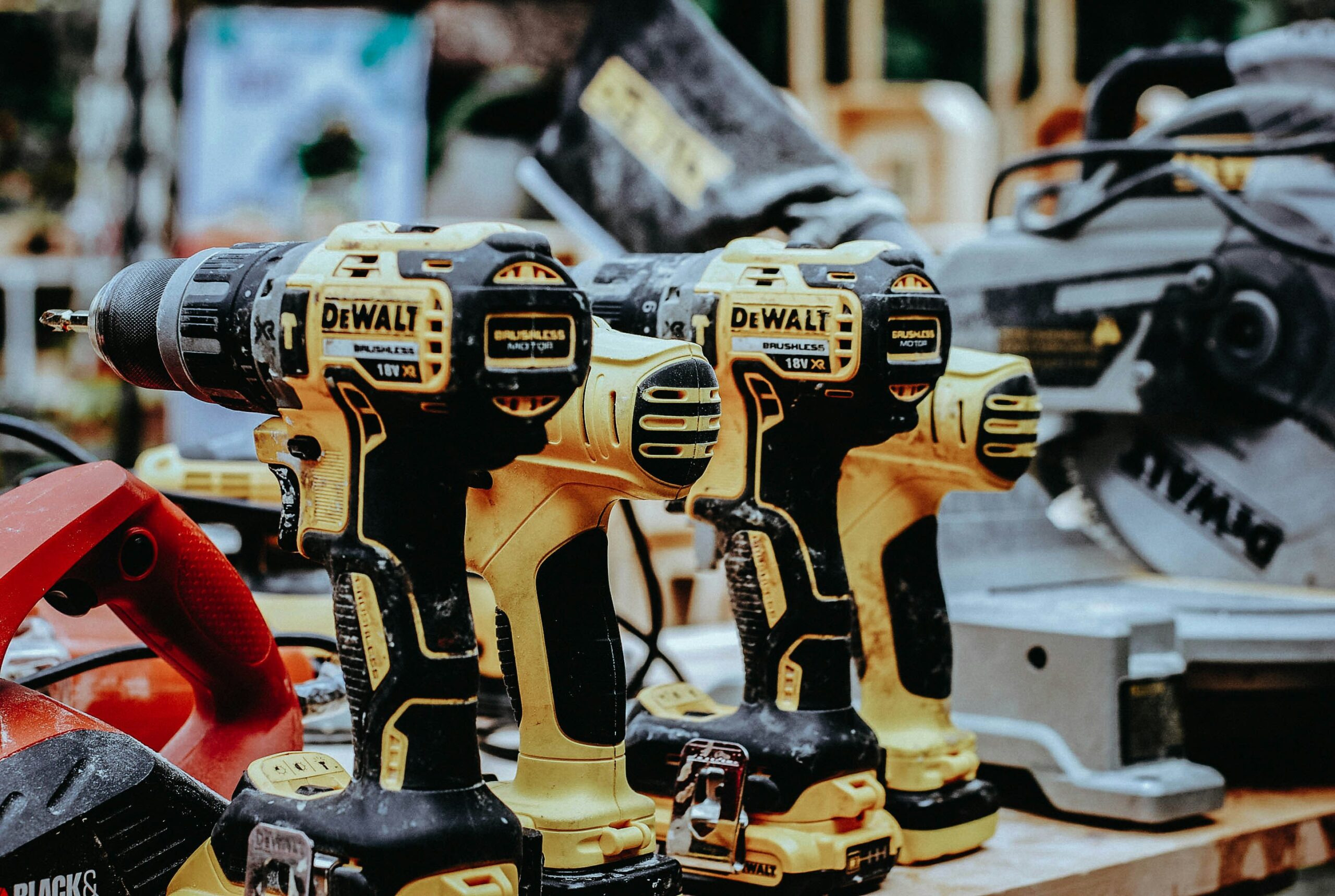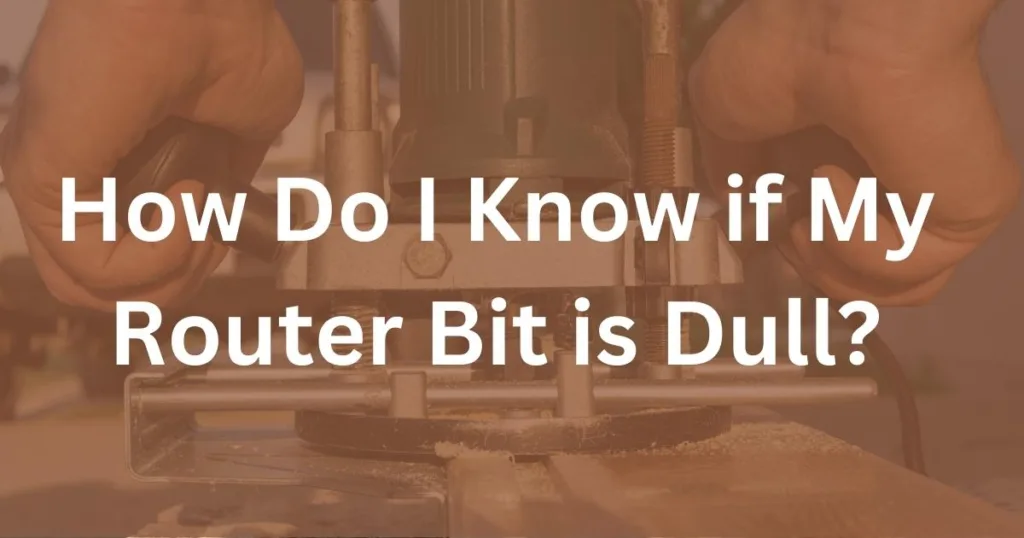
Whether you are new to woodworking or are experienced, there is one thing that is common to woodworkers; the need for the rights tools to be able to work on their project.
Without tools, there is not much that can be done as a woodworker. Determining what tools you will need can be a daunting task, especially if you are new, or are changing the type of project you are going to be working on.
This guide is a beginner-friendly way to get a better grasp on what types of tools you may want to invest in. We will look at both hand tools and power tools that are essential to woodworking shops.
Guide Note
Some of the tools mentioned in this guide are not “essential” but could be of use depending on your style of woodworking and projects and is therefore included. If you are just interested in the “essential” tools to get started, I have added an (E) next to the items you should really pay attention to.
Hand Tools
When it comes to hand tools, there are some tools that are going to be a staple of every woodworkers shop, even if they utilize power tools. There are also some hand tools that have a quicker, power tool equivalent which we will discuss in the next section.
Before you discount hand tools altogether, keep in mind that they still have their place in the workshop. Hand tools can help develop skills, give you more control over the work piece, or just may become your preferred way to work with wood.
Measuring Tools
- (E) Tape Measure: The tape measure is an essential for every woodworker; new and old alike. Without a tape measure, you are up the creek without a paddle. It is a necessity if you want any level of precision in your work. It will allow you to measure out exactly the correct lengths for your project.
- (E) Combination Square: A combination square is an important tool that will allow you to make straight lines on your work and aid in marking your wood for cutting and assembly. It is a simple but very useful tool to have in your workshop.
- Marking Gauge: Having a way to mark your workpiece for either cutting or some other process is a necessity. However, you don’t have to go fancy on the marking gauge. A nice marking gauge will provide better accuracy but a pencil, pen, and even a nail could accomplish the same task.
Cutting Tools

- (E) Hand Saw: The hand saw is a great tool to have in your shop. If you have a good saw and the right technique, you can make clean quick cuts. Every woodwork shop should have one of these.
- Chisels: Chisels may not be necessary depending on your other tools you have available, but I have found myself grabbing for one of these more often lately for small items and details that need more control than what you can get with a power tool.
- Coping Saw: A coping saw is a great tool to have due to how well its excels at cutting small precise details. It never hurts to have one of these laying around, but may not be essential if you are just starting out.
Shaping Tools
- Plane: There are many different types of planes. They do require a lot of skill but can be very rewarding as it can really take your work to the next level. There are power tools that can do the same thing (with less control and less skill) but they are quite a bit more expensive. A couple of planes in your workshop may not be essential at first, but as you start to progress, you will see where it can come in extremely handy.
- Spokeshave: A spokeshave is basically the same idea as a plane but it can allow you to shape and smooth curved surfaces. Also, there are power tools that can accomplish this but it ultimately comes down to preference and your woodworking style.
Finishing Tools
- (E) Sandpaper: Once your project has reached its final stages, you will need to prep it for finishing, which is where sandpaper comes in. There are powered versions but almost every project has a need for some good old fashioned hand sanding. I recommend keeping several different grits available in your shop.
- Hand Files & Rasps: You can use these tools to help with shaping wood and smoothing rough edges. It is always a good idea to have a few different ones handy in your shop.
Power Tools
Power tools increase a woodworkers efficiency by a significant amount, and can prove to be extremely helpful and time saving. Especially if you are making items for customers and need to be able to perform tasks at a much quicker rate.
Drills and Drivers

- (E) Cordless Drill/Driver: A cordless drill is an extremely useful tool to have in the workshop. Used for drillings holes and driving screws, I would consider the drill to be an essential tool for every woodworkers shop.
- Cordless Impact Driver: Depending on the project, an impact driver may be what you are looking for. They excel at driving screws with little effort from you, and are fairly lightweight when compared to a drill/driver combo. However, they do lack the finesse that you will get with a drill/driver combo.
- (E) Brad Nail Gun: A brad nail gun is a great way to hold your project together and in conjunction with glue, they are quite useful. I used my brad nail gun on almost every project.
Saws

- Circular Saw: A circular saw can be a cheap and portable option that can be used for ripping or crosscutting boards. It won’t have as much precision as some other options but is always handy to have in your shop.
- Jigsaw: If there are any curved or intricate shapes you plan on cutting, the jigsaw is a must-have tool for the shop. With its small blade, you can cut out a variety of shapes.
- (E) Miter Saw: A miter saw is like a circular saw, but stays stationary and can provide more precision and the ability to handle angled cuts. They are not too expensive and are an invaluable addition to the workshop.
- (E) Table Saw: The table saw is my personal favorite, especially on a budget. A good table saw can be pricey, but it can handle rip cuts, cross cuts, and angles cuts. If used in conjunction with a fence and jig, this is one of the most used tools in a workshop, and I would consider it to be essential.
Sanding and Planing
- (E) Random Orbital Sander: Arguable one of the best sanders to have in your shop. It can make quick work of sanding your project without leaving a lot of lines that will show up during the staining process. There are multiple sander types available but this is the first one I would get. It will make the finishing process a lot more efficient and speed up your build significantly.
- Thickness Planar: While the thickness planar is not necessarily essential if you are just starting out, it can make a world of difference if you have one in the shop. From reducing thickness of your workpiece to using it to take out warp in your boards, it is an effective tool of a woodworking shop.
Workshop Essentials: Setting Up for Success
Every woodworker will need a workshop that compliments the type of projects they plan to take on. Each workshop is unique to the person working in it. Things such as available size, type of projects, and equipment placement all play a role in to how a workshop is setup. I will go over a few of the important items that you will need to keep in mind when laying out your workshop.
Workbench

The workbench. The place where excitement and frustration can coexist. A workbench is the main area where your project will (or will not) come together. This is why it is important to have a high-quality, flat workbench to work on. It will be your main place of assembly and needs to be large enough to accommodate your projects as well as sturdy enough to stand up to some abuse.
There are two main routes you can go with this; you can purchase a workbench or go the DIY route. If this is your first workbench, I recommend purchasing one. There are affordable options out there, but if you are anything like me when I started out, it is hard to justify spending the money on a workbench over a necessary power tool. You can find a ton of ideas on the internet for DIY workbenches. I found a workbench guide online, which you can find here, from an online resource that details out how they built a workbench for around $50 that I would recommend checking out.
Clamps
Clamps. Lots and lots of clamps. This is an investment that is a game changer. Trying to hold pieces together while you screw or nail them togehter would be an absolute nightmare without any clamps. They will make your life and woodworking project much better if you have them.
I have done projects with no clamps due to budget constraints as a broke college kid, and let me tell you. After I bought a few clamps, I realized very quickly how important they were. Don’t underestimate their place in the workshop!
Safety Gear
When you talk about safety gear, this is where I see people tend to differ in their opinions. Some guys want to be “macho” and do without the necessary safety precautions. While on the other side, you got the guys who worry “too much”. I would put myself in the latter category because I can envision how all the different things in the shop can go wrong.
Safety Tip
When working with any kind of power tool, be sure to take some precautions. Do not wear loose clothing, jewelry, watches, rings and have your hair held back if it is long. Anything that can get caught in a power tool should be avoided!
Regardless of how you view safety in the workshop, there are a few things that everyone should use while working with wood.
- Safety Glasses
- Mask when cutting/sanding
- Push sticks for the table saw
- Respirator when fine dust or fumes are present
- Ear muffs/ear plugs when using loud equipment
Lighting
Bad lighting versus good lighting, is like night and day. It is much easier to work with your project under a lot of light versus one dim bulb in a garage. Spend a few bucks and get some LED strip lights, you will thank me later. Adequate lighting is a necessity for any woodworker, or any project for that matter.
Budget-Friendly vs. Premium Tools: What’s Worth the Investment?
When setting up a workshop, it’s important to balance budget constraints with the need for quality tools. Not all tools need to be premium, but some are worth the investment.
Where to Save?
For tools like clamps, sandpaper, and simple hand saws, budget options often perform well. Look for mid-range brands that offer good durability without the premium price tag. Harbor Freight can be your best friend in this category.
Where to Spend?
When it comes to power tools, it can be tempting to buy the cheapest availble. This may work on some tools, but it is much better to spend more money in this department, to get a higher quality tool. More money does not necessarily mean better performance and I am not saying to buy the most expensive tool. This is where some research will need to come into play.
A higher performance tool will do a few things for you.
- It will improve the quality of your project.
- The tool will generally last longer.
- It can potentially be a safer tool. Even if its just added features or more power to make sure workpieces don’t get caught and have unexpected behavior.
Conclusion
Building a well-equipped woodworking shop takes time, but by focusing on essential tools and smart investments, you can create a workshop that grows with you. Starting with a mix of hand tools and power tools is probably the best beginner friendly way to approach creating your workshop.


